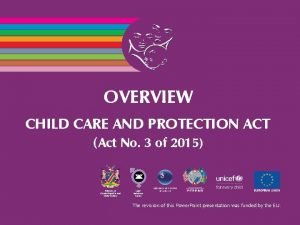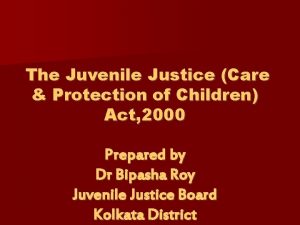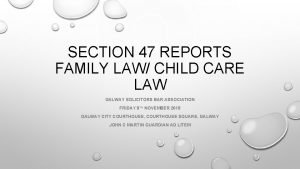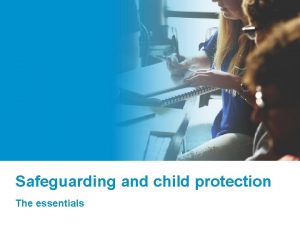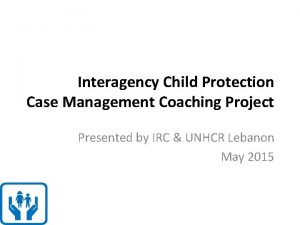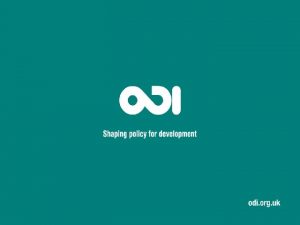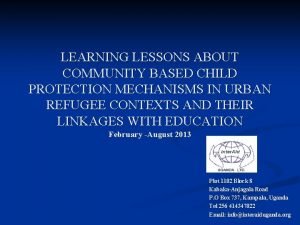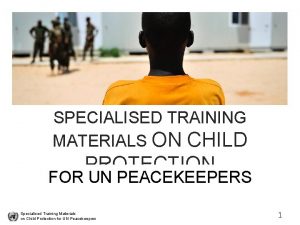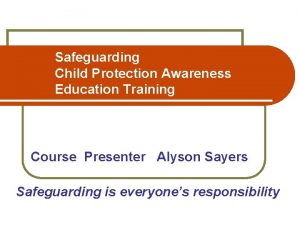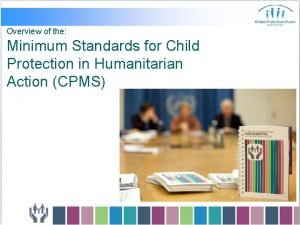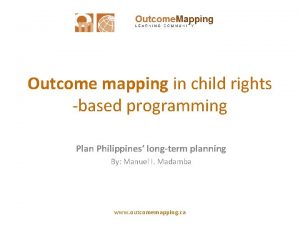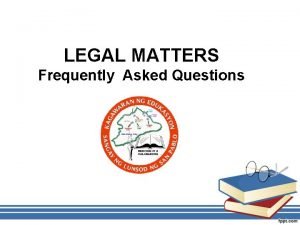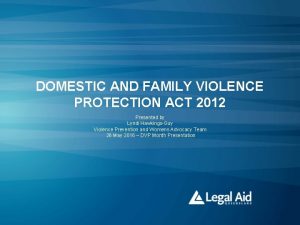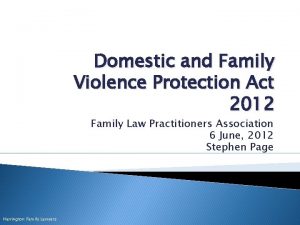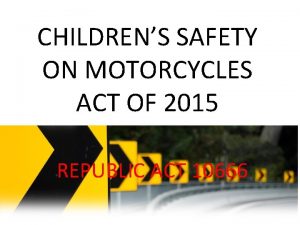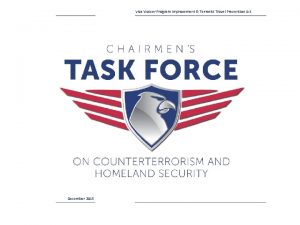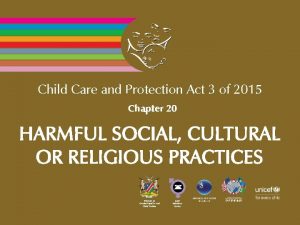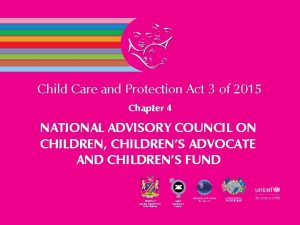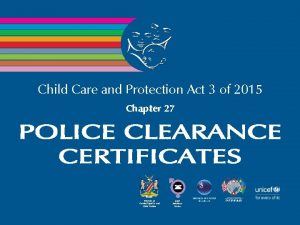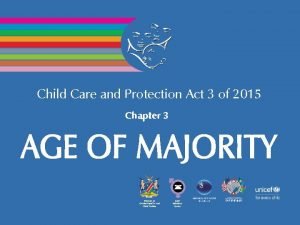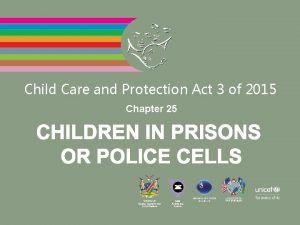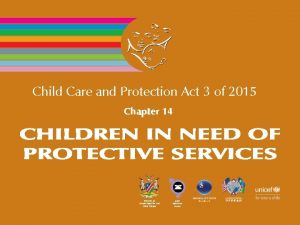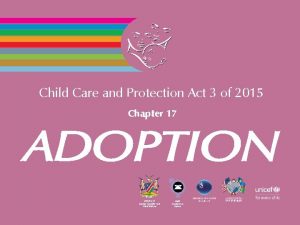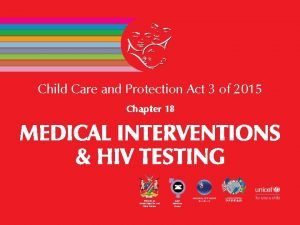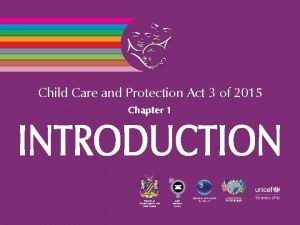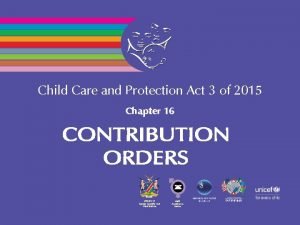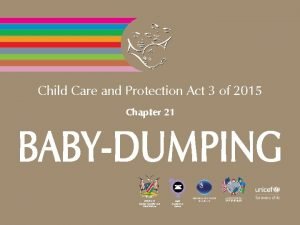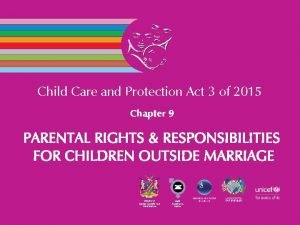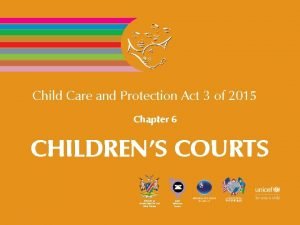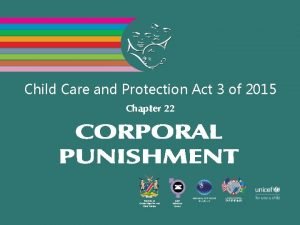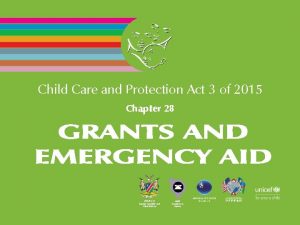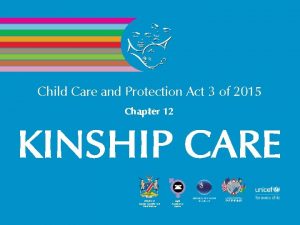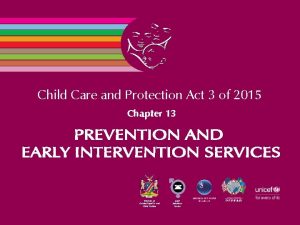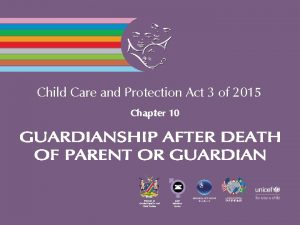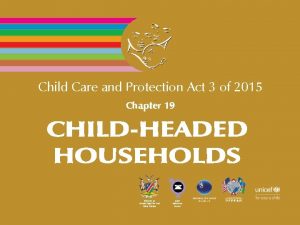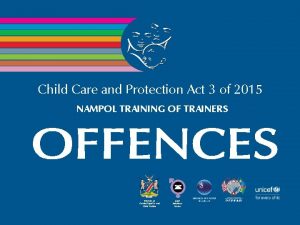Child Care and Protection Act 3 of 2015




























- Slides: 28

Child Care and Protection Act 3 of 2015 Chapter 15 Ministry of Gender Equality and Child Welfare Legal Assistance Centre

Overview The Child Care and Protection Act introduces a new distinction between foster care and kinship care. l Foster care refers to situations where children are placed by court order with someone who is unrelated to them. l Kinship care refers to situations where children are placed with extended family members or close family friends. Persons who want to become foster parents must be approved and listed in a register of prospective foster parents in advance of the placement of a child with them.

1. What is foster care? l The Act defines foster care as the “care of a child by a person who is not the parent, guardian or family member or extended family member of the child”. l Children are placed in foster care by an order of the children’s court after a child protection hearing. l Foster parents play a similar function as children’s homes, but in a family environment. l Children may be placed with foster parents for short temporary periods, or on a longer-term basis – depending on their situation.

Who is a family member?

Foster care versus kinship care

2. Who can be a foster parent? l A foster parent can be - o a single individual o a married couple applying jointly. l A foster parent must be - o a fit and proper person to be entrusted with the child o willing and able to undertake parental rights & responsibilities o not convicted of certain serious crimes.

Which crimes? Murder Rape & incest Indecent assault Assault GBH Kidnapping Statutory sexual offences Pornography Human trafficking Abduction

Application process A “designated social worker” is a State or private social worker authorised by the Minister to carry out specific tasks.

Application information l Basic information about applicant (citizenship, marital status, religion, languages spoken, household members) l Financial position l Health l Preferences (sex or age of foster child) l Interest to adopt foster child in future l Police clearance certificate

Social worker assessment The social worker will investigate as necessary and prepare a written assessment with information on: l applicant’s background l applicant’s interpersonal relationships l relevant physical & psychological issues l relevant socio-economic issues, including religion l relevant housing & environmental issues l motive for wanting to be a foster parent l conclusion on whether or not legal requirements are met.

Criteria for assessment • Suitable place to live? • Living conditions appropriate for child’s health & well-being? • Will co-operate to reunify child’s family (if appropriate)? • Adequate financial support? • Will co-operate with review re: possible extension of foster care? • Will ensure that school-age child attends school regularly? • Will put child in ECD programme if appropriate? • Ability to accommodate special needs? • Will allow social worker access to foster child and foster home? • Will use grant money or financial • Will respect foster child’s views? assistance appropriately? • Will allow contact between child & the • Will promote child’s well being, development & best interests? ` family if appropriate? • Will respect foster child’s religion and culture? • Will help foster child maintain links with culture & heritage? • Will guide child with positive discipline? • Will treat all children in household similarly & fairly? • Police clearance certificate provided?

Examples

Registration of prospective foster parent l If an application is approved by the Minister, a prospective foster parent is listed in the Register of Prospective Foster Parents. l A children’s court may order the placement of a child in foster care only with foster parents listed in the register. l The Minister can impose conditions on the approval, such as limiting foster care to children of particular ages, or children with only certain kinds of special needs. l Registration as a prospective foster parent is valid for three years. It may be renewed for two years at a time after a re-assessment. l A foster parent who wants to renew registration must make a written request to a social worker at least three months before the current registration expires.

Removal from register l The prospective foster parent withdraws the registration in writing. l The prospective foster parent dies. l The Minister cancels the registration because the prospective foster parent is no longer fit to be a foster parent, or no longer willing and able to do so. l A child is removed from the care of the foster parentin a child protection proceeding. l The foster parent is convicted of one of the specified offences.

Example

3. Court orders for foster care l Placement in foster care is one type of alternative placementwhich a children’s court can order after a child protection hearing. Foster care provides a familylike environment. l A child may not be placed in foster care if this would result in more than six children in total in the household– counting foster parent’s own children + foster children. But the court can make an exception if it is in all the children’s best interests. l Foster care normally ends when the child reaches age 18. l Two possibilities for extension: o Child is entitled to remain in foster care until the end of a the year when the child turns 18 IF the child wishes o Child may remain in foster care until the end of the year when the child turns 21 IF the child requests permission from the Minister to remain in order to complete education or training AND foster parent agrees to continue the care

Foster home as place of safety l The residence of a person approved as a foster parent can be used as a place of safety for the temporary care of a child. l No particular procedure for this - a person approved to care for foster children is logically suitable to provide a temporary place of safety for a child. l It appears that any person listed on the Register of Prospective Foster Parents can provide a place of safety for a child in need of temporary care (if they are willing).

Transfer of parental rights & responsibilities Rights: l rights of custody or control Responsibilities: l promote child’s health & well-being l encourage contact with parents, family & friends (unless prohibited by court order / not in child’s best interests) l inform parent or family about child’s progress l allow child to return home for trial periods (as arranged by social worker) l encourage child to become independent & self-reliant l arrange basic medical interventions for foster child (can also consent to surgery in emergencies)

Parental powers NOT transferred l power to grant permission for child to leave Namibia l power to deal with child’s property of the child l power to consent to marriage l power to consent to adoption

Decision-making powers

Additional responsibilities l l care of foster child cannot be delegated to someone else for more than one week notify supervising social worker of any significant change of circumstances of foster child OR foster parent notify supervising social worker of any serious illness or injury to foster child notify supervising social worker of change of address CORPORAL PUNISHMENT PROHIBITED A foster parent may NOT use corporal punishment on a foster child.

Duty not to abuse or neglect A foster parent may not abuse, neglect or abandon a foster child. This is a CRIME punishable by a fine of up to N$50 000 or imprisonment of up to 10 years. CORPORAL PUNISHMENT PROHIBITED A foster parent may NOT use corporal punishment on a foster child.

Termination of foster care Foster care may be terminated by a children’s courtif this is in the best interests of the child. The court will consider the following factors: l bond between child and parent (if child’s parent wants to reclaim care of the child) l bond between the child and foster parent (also between child and foster parent’s family) l prospects for achieving permanence in child’s life (through return to parent, permanent foster care, adoption or some other alternative care).

Death of a foster child l If a child dies in foster care, the foster parent must immediately report to police or social worker l Police or social worker must notify child’s parent, caregiver or guardian l Police or social worker must investigate

Foster parent grants l A foster parent is eligible for a foster parent grant for each foster child, payable as long as the child is in foster care l In addition, a foster parent can apply for a child disability grant if the foster child has a disability. Misuse of grants is punishable by a fine of up to N$4000 or imprisonment for up to 12 months

Automatic fee exemptions l free basic education in state schools & exemption from school development funds l subsidized school uniforms, shoes and stationery l free basic health care l no fees for official government documents

Cluster foster care refers to services offered by an NGO to support, mentor, supervise and advise foster parents. These services are intended to assist foster parents to care for foster children, especially children with special needs or disabilities.

 Child care and protection act 3 of 2015
Child care and protection act 3 of 2015 Children's rights and responsibilities posters
Children's rights and responsibilities posters Child protection and toy safety act
Child protection and toy safety act Child protection reform amendment act 2017
Child protection reform amendment act 2017 Care and protection of children act
Care and protection of children act Handle information in care settings
Handle information in care settings Section 47 family law act
Section 47 family law act Safeguarding and child protection the essentials
Safeguarding and child protection the essentials Level of care primary secondary tertiary
Level of care primary secondary tertiary Courage child protection
Courage child protection Opinyon tungkol sa child protection policy
Opinyon tungkol sa child protection policy Child marriage definition
Child marriage definition Child protection case management tools
Child protection case management tools Types of child protection
Types of child protection Professional curiosity in child protection
Professional curiosity in child protection Community based child protection mechanisms
Community based child protection mechanisms Child protection training materials
Child protection training materials Child protection awareness training
Child protection awareness training Child protection minimum standards
Child protection minimum standards Child protection policy example
Child protection policy example 2 disinterested person
2 disinterested person Macbeth act 2 summary
Macbeth act 2 summary Domestic and family violence protection act 2012
Domestic and family violence protection act 2012 Domestic and family violence protection act 2012
Domestic and family violence protection act 2012 승자트리
승자트리 Children’s safety on motorcycles act of 2015
Children’s safety on motorcycles act of 2015 Travel prevention act of 2015
Travel prevention act of 2015 Fiji companies act 2015
Fiji companies act 2015 Child care facility rules and regulations exam
Child care facility rules and regulations exam

